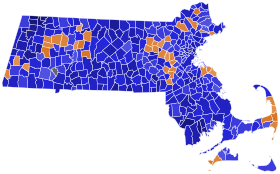| |||||||||||||||||||
| ← MDMO → | |||||||||||||||||||
118 delegates to the Democratic National Convention (93 pledged, 25 unpledged) The number of pledged delegates received is determined by the popular vote | |||||||||||||||||||
|---|---|---|---|---|---|---|---|---|---|---|---|---|---|---|---|---|---|---|---|
| |||||||||||||||||||
 County results
County results Municipality resultsGore: 45–50% 50–55% 55–60% 60–65% 65–70% 70–75% 75–80% 80–85%
Municipality resultsGore: 45–50% 50–55% 55–60% 60–65% 65–70% 70–75% 75–80% 80–85%Bradley: 45–50% 50–55% 55–60% Tie: | |||||||||||||||||||
The 2000 Massachusetts Democratic presidential primary took place on March 7, as one of 16 contests scheduled on Super Tuesday in the Democratic Party primaries for the 2000 presidential election, following the Washington primary the weekend before. The Massachusetts primary was a semi-closed primary, with the state awarding 118 delegates towards the 2000 Democratic National Convention, of which 93 were pledged delegates allocated on the basis of the results of the primary.
Vice president Al Gore came in first with just shy of 60% and earned 58 delegates. Senator Bradley finished behind in second place with a little more than 37% and 35 delegates, while Uncommitted votes took a third-place finish with around 1% of the vote.
Procedure
Massachusetts was one of 15 states and one territory holding primaries on March 7, 2000, also known as "Super Tuesday".
Voting took place throughout the state from 7:00 a.m. until 8:00 p.m. In the semi-closed primary, candidates had to meet a threshold of 15 percent at the congressional district or statewide level to be considered viable. The 93 pledged delegates to the 2000 Democratic National Convention were allocated proportionally on the basis of the results of the primary. Of these, between 6 and 7 were allocated to each of the state's 10 congressional districts and another 12 were allocated to party leaders and elected officials (PLEO delegates), in addition to 20 at-large delegates.
The state party committee met and voted on the 20 at-large and 12 pledged PLEO delegates for the Democratic National Convention. The delegation was joined by 23 unpledged PLEO delegates: 9 members of the Democratic National Committee, 12 members of Congress (both senators, Ted Kennedy and John Kerry, and 10 representatives, John Olver, Richard Neal, Jim McGovern, Barney Frank, Marty Meehan, John Tierney, Ed Markey, Mike Capuano, Joe Moakley, and Bill Delahunt), 2 distinguished party leaders, and 2 add-ons.
| Pledged national convention delegates | |||
|---|---|---|---|
| Type | Del. | Type | Del. |
| CD1 | 6 | CD6 | 6 |
| CD2 | 6 | CD7 | 6 |
| CD3 | 6 | CD8 | 6 |
| CD4 | 6 | CD9 | 7 |
| CD5 | 6 | CD10 | 6 |
| PLEO | 12 | At-large | 20 |
| Total pledged delegates | 93 | ||
Candidates
The following candidates appeared on the ballot:
Results
| Candidate | Votes | % | Delegates |
|---|---|---|---|
| Al Gore | 341,586 | 59.77 | 58 |
| Bill Bradley | 212,452 | 37.17 | 35 |
| Uncommitted | 11,281 | 1.97 | 25 |
| Write-in votes | 4,073 | 0.71 | |
| Lyndon LaRouche Jr. | 2,135 | 0.37 | |
| Total | 570,074 | 100% | 118 |
References
- ^ "Massachusetts Democratic Delegation 2000". The Green Papers. December 24, 2000. Retrieved September 19, 2023.
- "Presidential Primaries, Caucuses, and Conventions Chronologically - Key and Minor Dates". The Green Papers. Retrieved September 13, 2023.
- "2000 President Democratic Primary". Secretary of the Commonwealth of Massachusetts. Retrieved September 19, 2023.
- "Election 2000: Massachusetts Democrat". The Green Papers. Retrieved September 19, 2023.


